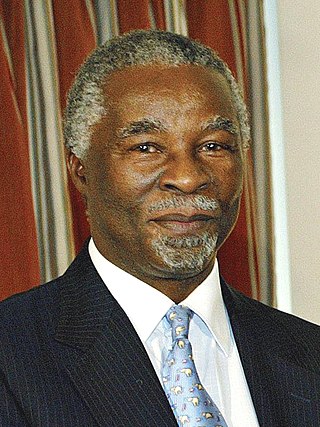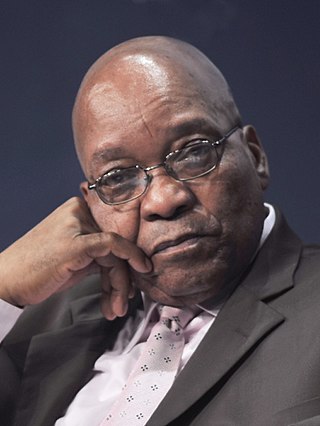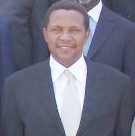
Thabo Mvuyelwa Mbeki is a South African politician who served as the second democratic president of South Africa from 14 June 1999 to 24 September 2008, when he resigned at the request of his party, the African National Congress (ANC). Before that, he was deputy president under Nelson Mandela from 1994 to 1999.

Mantombazana "Manto" Edmie Tshabalala-Msimang OMSS was a South African politician. She was Deputy Minister of Justice from 1996 to 1999 and served as Minister of Health from 1999 to 2008 under President Thabo Mbeki. She also served as Minister in the Presidency under President Kgalema Motlanthe from September 2008 to May 2009.

Jacob Gedleyihlekisa Zuma is a South African politician who served as the fourth president of South Africa from 2009 to 2018. He is also referred to by his initials JZ and clan names Nxamalala and Msholozi. Zuma was a former anti-apartheid activist, member of uMkhonto we Sizwe, and president of the African National Congress (ANC) from 2007 to 2017.

Nkosazana Clarice Dlamini-Zuma, sometimes referred to by her initials NDZ, is a South African politician, medical doctor and former anti-apartheid activist. A longstanding member of the African National Congress (ANC), she currently serves as Minister in the Presidency responsible for Women, Youth and Persons with Disabilities and is the Chancellor of the University of Limpopo.
The following lists events that happened during 2003 in South Africa.

Grace Naledi Mandisa Pandor is a South African politician, educator and academic serving as the Minister of International Relations and Cooperation since 2019. She has served as a Member of Parliament (MP) for the African National Congress (ANC) since 1994.

Angela Thokozile Didiza is a South African politician who is currently serving as Minister of Agriculture, Land Reform and Rural Development since May 2019. A member of the African National Congress (ANC), she was the Minister of Agriculture and Land Affairs from June 1999 to May 2006 and Minister of Public Works from May 2006 to September 2008.

HIV/AIDS is one of the most serious health concerns in South Africa. The country has the highest number of people afflicted with HIV of any country, and the fourth-highest adult HIV prevalence rate, according to the 2019 United Nations statistics.
South Africa since 1994 transitioned from the system of apartheid to one of majority rule. The election of 1994 resulted in a change in government with the African National Congress (ANC) coming to power. The ANC retained power after subsequent elections in 1999, 2004, 2009, 2014, and 2019. Children born during this period are known as the born-free generation, and those aged eighteen or older, were able to vote for the first time in 2014.
Virodene was claimed to be an HIV/AIDS drug developed in South Africa, but was rejected by the scientific community. Controversy surrounded the research procedures, political interference and the safety and efficacy of the drug itself, the main active ingredient of which is the highly toxic industrial solvent dimethylformamide.
The 52nd National Conference of the African National Congress (ANC) was held in Polokwane, Limpopo, from 16 to 20 December 2007. At the conference, Jacob Zuma and his supporters were elected to the party's top leadership and National Executive Committee (NEC), dealing a significant defeat to national President Thabo Mbeki, who had sought a third term in the ANC presidency. The conference was a precursor to the general election of 2009, which the ANC was extremely likely to win and which did indeed lead to Zuma's ascension to the presidency of South Africa. Mbeki was prohibited from serving a third term as national President but, if re-elected ANC President, could likely have leveraged that office to select his successor.
The National Executive Committee (NEC) of the African National Congress (ANC) is the party's chief executive organ. It is elected every five years at the party’s national conference; the executive committee, in turn, elects a National Working Committee for day-to-day decision-making responsibilities. At the NEC's head is the president of the ANC, and it also contains the other so-called "Top Seven" leaders : the deputy president, chairperson, secretary-general, two deputy secretaries-general and treasurer-general.
The 51st National Conference of the African National Congress (ANC) was held at the University of Stellenbosch in Stellenbosch, Western Cape, from 16 to 20 December 2002, during the ANC's 90th anniversary. President Thabo Mbeki was re-elected to the party presidency and, notably, there was no change in other five top leadership positions except for Deputy Secretary General. There was also little competition for other spots on the National Executive Committee (NEC). This ANC conference has thus been called "the quietest in its history."

The Congress of the People (COPE) is a South African political party formed in 2008 by former members of the African National Congress (ANC). The party was founded by former ANC members Mosiuoa Lekota, Mbhazima Shilowa and Mluleki George to contest the 2009 general election. The party was announced following a national convention held in Sandton on 1 November 2008, and was founded at a congress held in Bloemfontein on 16 December 2008. The name echoes the 1955 Congress of the People at which the Freedom Charter was adopted by the ANC and other parties, a name strongly contested by the ANC in a legal move dismissed by the Pretoria High Court.

Botswana–South Africa relations refers to the historical and current relationship of Botswana and South Africa. Botswana has a high commission in Pretoria, and South Africa has a high commission in Gaborone. Both countries are former British colonies and members of the African Union, the Commonwealth of Nations, and the Southern African Development Community (SADC).

Bathabile Dlamini is a South African politician who was the President of the African National Congress (ANC) Women's League from 2015 to 2022. She was previously the Minister in the Presidency for Women from 2018 to 2019 and the Minister of Social Development from 2010 to 2018.

The first inauguration of Jakaya Kikwete as the 4th president of Tanzania took place on Wednesday, 21 December 2005. It marked the commencement of the first five-year term of Jakaya Kikwete as President and Ali Mohamed Shein as Vice President.
In South Africa, HIV/AIDS denialism had a significant impact on public health policy from 1999 to 2008, during the presidency of Thabo Mbeki. Mbeki criticized the scientific consensus that HIV is the cause of AIDS beginning shortly after his election to the presidency. In 2000, he organized a Presidential Advisory Panel regarding HIV/AIDS including several scientists who denied that HIV caused AIDS.

Robben Island Prison is an inactive prison on Robben Island in Table Bay, 6.9 kilometers (4.3 mi) west of the coast of Bloubergstrand, Cape Town, South Africa. Nobel Laureate and former President of South Africa Nelson Mandela was imprisoned there for 18 of the 27 years he served behind bars before the fall of apartheid. Since then, three former inmates of the prison have gone on to become President of South Africa.
Rejoice Thizwilondi Mabudafhasi is a South African politician who represented the African National Congress (ANC) in the National Assembly from 1994 until her resignation in April 2017. She was appointed as South Africa's Ambassador to Zimbabwe in 2021.












